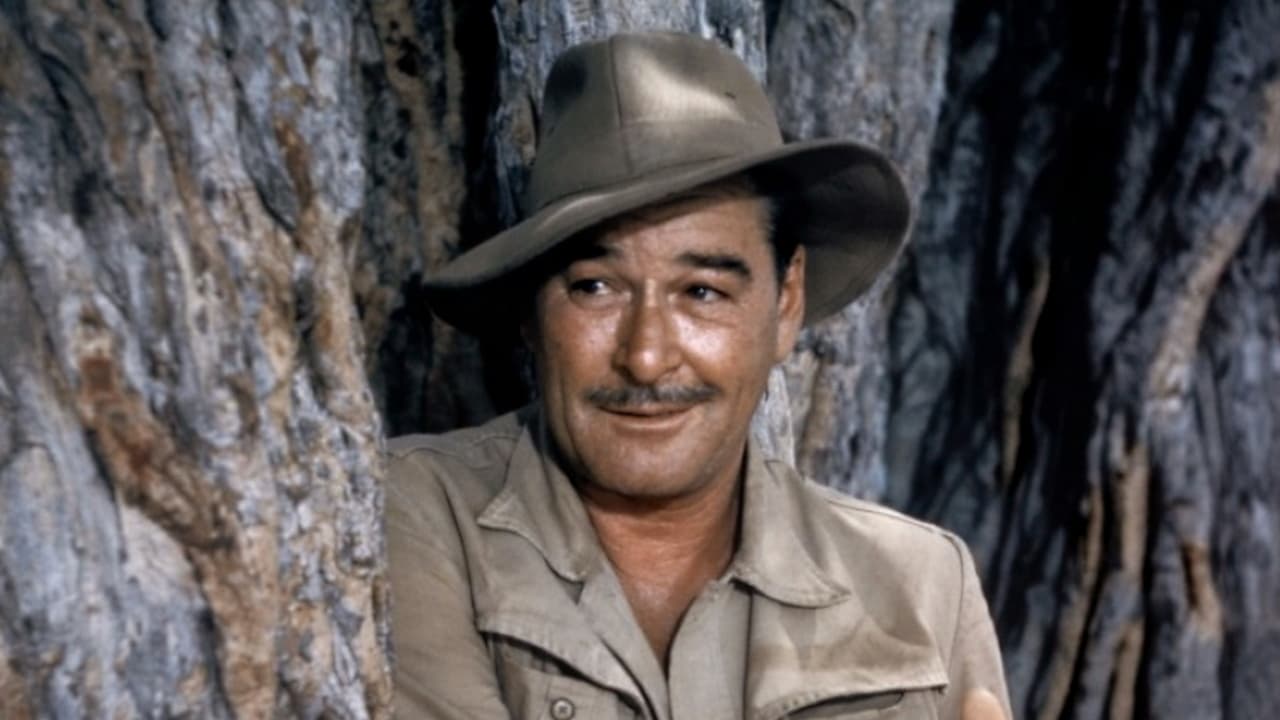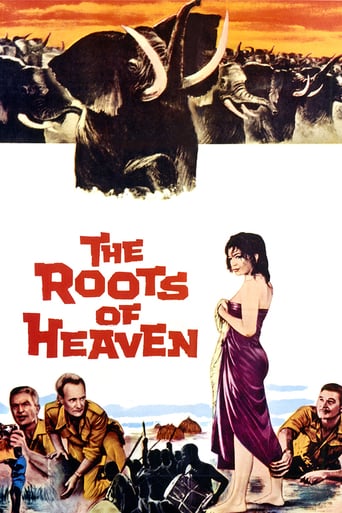

one of my absolute favorites!
... View MoreExcellent, Without a doubt!!
... View MoreIt's the kind of movie you'll want to see a second time with someone who hasn't seen it yet, to remember what it was like to watch it for the first time.
... View MoreIt is interesting even when nothing much happens, which is for most of its 3-hour running time. Read full review
... View More"Roots of Heaven" was an interesting idea, but executed with enough flatulence and hot air to have been a major cause of the increase in Earth's greenhouse gases.The story of a man, and a small group of followers, who go on what becomes an illegal crusade to stop the slaughter of the African elephant, should have made an inspiring film.There have been plenty of reasons given why such a worthy project turned out so lacklustre, but I feel the main reason is not necessarily the accepted ones of confused story lines and undefined characters - the problem is more in your face.The film is full of eccentrics: loud, bombastic, opinionated and declarative ones, and eccentric characters are rarely appealing or even entertaining.John Huston made some of the best films of all time: "The Maltese Falcon", "Treasure of the Sierra Madre", "Moby Dick" and about a dozen others. They all featured 'larger-than-life' characters, however the 'larger-than-life' characters got away from him on this one and actually became annoying.Of course Huston may not have noticed what was happening because he was probably a bit like that himself, and often had a hand in the scripts.He and scriptwriter Romain Cary (the author of the novel) created a character, Morel, played by an uncharismatic Trevor Howard, who seemed to have a number of variations on his expansive character throughout the cast; just look at the performances of Orson Welles, Errol Flynn, Frederick Ledebur, Oliver Hussenot, Gregoire Aslan, Francis de Wolff, and Eddie Albert - definitely a fail in first-term screen writing class.The film looks good when it steps outside with fabulous shots of elephants and Africa, but of course the cast and crew famously suffered for that authenticity. The interiors back in the London studio were another matter, and look over-lit and fake.Although Juliette Gréco was apparently forced on the film because she was producer Darryl Zanuck's mistress at the time, her understated performance was a relief from all the histrionics surrounding her.Like many reviewers I feel that "Roots of Heaven" is fascinating more for what went on behind the camera than in front of it. The good news was that Huston bounced back - "The Man Who Would Be King" and "Fat City", were impressive ways to wind up a Quixotic and sometimes chaotic career.
... View MoreI can't say I really enjoyed this film but as a fan of both Flynn and Welles it was rewarding to watch. Considering how terrible he looked earlier in "Istanbul" and "The Sun Also Rises" Flynn looks relatively spry and rugged in what would prove to be his last real film role. Although he has little to do his is a likable character and one cannot help but feel a strong parallel between the role of Forsythe and the man portraying him. There is a sense of regret and bitterness in Forsythe that Flynn no doubt felt in his own life. As for Welles, he is amusing in a 5 minute role and his appearance made me immediately think of Jackie Gleason in the "Smokey and the Bandit" films.The film itself is too long and hammers home its point with the delicacy of a sledgehammer. William Holden would have been great as Morel; Trevor Howard is too abrasive and difficult to sympathize with. Eddie Albert & Herbert Lom are wasted while Paul Lukas disappears midway through the film. Juliette Greco is fine as the heroine and manages to look glamorous throughout.The story behind the film sounds much more interesting than the film itself. I particularly liked the story of John Huston decking Flynn after much boozing. Apparently they fought several times when Flynn was younger and in shape with Flynn beating him into submission every time. I guess Huston gained some measure of payback here by taking advantage of the declining star.
... View MoreIt's about an ex-soldier, Morel (played by Trevor Howard), who has come to Africa to protect elephants against extinction. He sees them as noble animals and as 'roots of heaven', that is creatures made by God. First, no one is on his side, but later he manages to find some supporters. The authorities are after them, and they also have to defend themselves against some hunters who want to kill a large herd of elephants.It was interesting to see how and for what motives some of the characters change their attitudes towards Morel. Some of his pursuers stop pursuing him or even start to help him, and some of his followers leave him and take part in hunting the large elephant herd. I found the character Waitari, an African freedom fighter, to be especially interesting. He has many difficulties. The French colonial authorities are after him, he wants to protect the elephants because they are a symbol of African freedom, he needs money for weapons, and he has to try to control his followers, who want to start an armed fight against the French although it is (probably) too early for that.At first I didn't like Morel very much. I thought that the priest was right who scolds him for loving animals more than human beings, who need help more than animals. (And as far as I know elephants can be very dangerous. I've seen a documentary about that. When you are in a forest that they see as their territory (that you have trespassed on), they first approach you, and you can't hear them because their feet are so soft. Then they grab you with their trunks and hurl you through the air. A few people die that way every year.) But later in the movie one learns how Morel came to love elephants so much: he was a soldier in WW II, and during the years he had to spend in a prison camp, he read books about elephants. They became a symbol of freedom for him. So I understood and liked him better, and there's nothing wrong about protecting animals anyway (although I think that fighting hunger in the world is still more important.) Plus Howard acts really well in my opinion.The main reason I watched this movie is that I have been a fan of Errol Flynn ever since I first saw him in 'The Sea Hawk'. In this one, he gets top billing, but he is a supporting actor only. (As I've said before Trevor Howard plays the hero, but the producers probably thought he was not famous enough to get top billing). I think his acting is good. But I think some scenes were very easy to play for him anyway; he plays an alcoholic, and in some scenes he looks as if he was really drunk (when he arrives, with Greco, at the tribal village). (That's what's called 'method acting' ;)I also usually like films starring or directed by Welles or Huston. Welles only has a small part and I think he overacts, but that doesn't matter because he is really funny in my opinion. The direction is mostly good, as far as I can tell, but some of it could have been done better: there are some long shots of elephants that don't seem to fit in very well with the other shots. Or is this perhaps the editor's (not the director's) fault? I don't know. (There are also some blue-screen shots that don't look very good.)All in all, I really liked this movie. I think it has some minor flaws, and I didn't like it as much as, for example, 'The Sea Hawk' and 'The Maltese Falcon'. But, as I've said before, I liked both the story and the actors, so I have given this one eight points. I also liked the music (by Malcolm Arnold).If you like this one you might also try 'White Hunter Black Heart'. It stars Clint Eastwood as John Huston (although he's called 'John Wilson'). I liked it, too, but I liked 'The Roots of Heaven' better. And if you also find the character Waitari interesting, try 'Queimada'. It has a similar character and he's more central to the story. It's not as unknown as 'The Roots of Heaven', but still rather unknown, which is a mystery to me. It stars Brando, has music by Morricone, is directed by Gillo Pontecorvo (of 'La Battaglia di Algeri' fame), and, most importantly, its story is extremely interesting in my opinion.
... View More"Turgid philosophising"... "raddled Flynn"... no-one seemed to have a good word for this film, known chiefly for the number and variety of ailments suffered during its filming, and I certainly wasn't expecting much.Nobody told me "The Roots of Heaven" could be funny.Nobody told me the script was ironic and self-aware, knowing what to say and what to leave unspoken and when to wear its passion on its sleeve with the straightforward and very English eccentricity of its leading character; tinged with idealism, with heroism, and with cynicism alike. No-one ever mentioned, oddly enough, that there were even any environmentalists in the 1950s -- with uncannily accurate prescience, the plot even ties in the anti-nuclear cause. Greenpeace would have had a retrospective field day! And as for Flynn, he is having the time of his life stealing every scene he is in, whether with a quizzical eyebrow or a moment of sudden intense sympathy; the part is a gift, but he makes it something more, with the old expressiveness that always underpinned the laughter and heroics of his days as Warner Brothers' leading man. His late-career performance in "The Sun Also Rises" (which, for my money, really is turgid philosophical stuff) has been proclaimed as 'Oscar-worthy' by those eager to prove he had straight acting talent, but to my mind he shows greater depths here.Trevor Howard is the undoubted star, carrying much of the film single-handed. He is superbly convincing in the linchpin role of the Englishman who sets out on an unfashionable one-man crusade, and -- in a tale whose wry sensibilities would not be out of place at Ealing Studios -- finds himself inadvertently the victim of human nature's instinct both to canonise and to desecrate. The character has convictions, but he is neither unworldly nor a fool, and Howard makes us believe against the odds that this unassuming type can change people. His performance is absolutely central to the film's credibility, and he makes Morel not only believable but likable.The main flaws of which I was aware are the way that several strands seem to disappear abruptly unexplained at the ending (what of all those journalists who were about to arrive? What of the American's photographs, surely valuable evidence?) and a handful of blue-screen shots against poorer-quality backgrounds that are very obvious when viewed at cinema scale -- it might have been better to have used quick cuts back and forth between the characters and the action, rather than attempting to project them into the picture.So far as the overall standard of the film was concerned, however, I was extremely favourably surprised; I've seen several turgid, would-be meaningful African epics, and this certainly isn't one of them. Intelligent, humorous, lightly ironic, but also genuinely stirring and mythical, the end product may have disappointed John Huston, but it was far better than I had been given -- even by the cinema's own programming material! -- to expect.
... View More